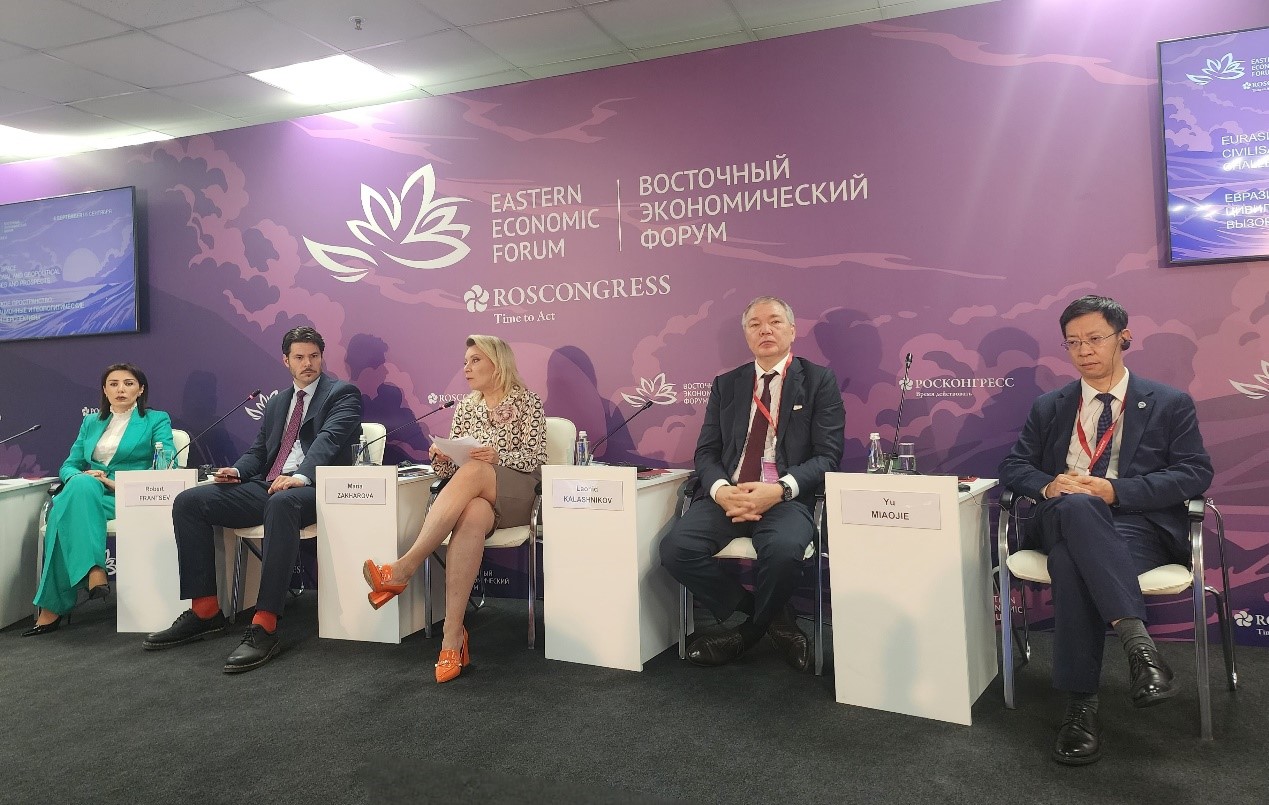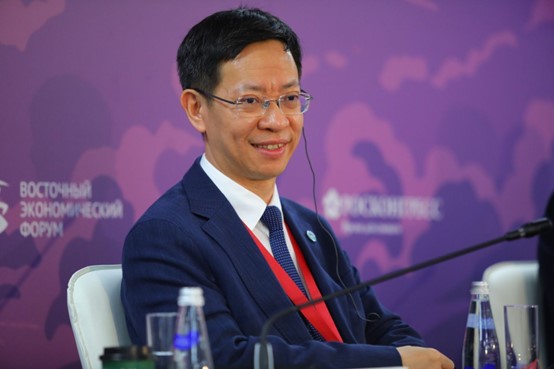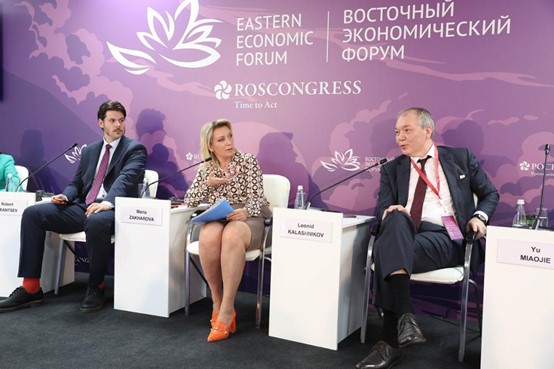From September 3 to 6, 2024, the 9th Eastern Economic Forum was held in Vladivostok, Russia. The forum, themed ‘Far East 2030: Combining Strengths to Create New Potential’, brought together over 6,000 officials, entrepreneurs, scholars, and experts from 76 countries and regions. The agenda included discussions on international cooperation in a changing world, issues related to the global economy and financial situation, and the development of Russia’s Far East and its role in the region.
Professor Yu Miaojie, a Deputy to the 14th National People’s Congress, fellow of the International Economics Association, Deputy Secretary of the CPC Committee and President of Liaoning University was invited to attend the 9th Eastern Economic Forum and visited the Russian Far Eastern Federal University during the time. Associate Professor Yin Ruyu, Deputy Director of the Office of International Affairs, Professor Yin Hong from School of International Economics and International Relations and Assistant Professor Chen Feng from Li Anmin Institute of Economic Research also joined the visit and conducted academic exchanges.
On September 6, President Yu Miaojie was invited to attend the sub-forum ‘Eurasian Space: Civilizational and Geopolitical Challenges and Prospects’. The forum was hosted by Robert Frantsev, Head of the Central Asian Bureau, All-Russia State Television and Radio Broadcasting Company, and Host of the program ‘In the Center of Asia’. Other speakers included Maria Zakharova, Director of Department of Information and the Press, Ministry of Foreign Affairs of the Russian Federation; Leonid Kalashnikov, Chairman of the Committee of the State Duma of the Federal Assembly of the Russian Federation for the Commonwealth of Independent States, Eurasian Integration and Relations with Compatriots; Gohar Barseghyan, Minister for Industry and Agro-Industrial Complex, Eurasian Economic Commission; and Dmitry Volvach, Deputy Minister of Economic Development of the Russian Federation.

President Yu Miaojie offered four key insights on the Belt and Road Initiative (BRI) and the current and future state of China-Russia economic cooperation.
The first point concerned the participation of global economies and economic growth. President Yu first reviewed the significant achievements of the BRI since it was launched in 2013. He noted that the BRI has completed a decade and played a crucial role in promoting global trade and economic growth. According to data, global trade volume under the BRI framework has increased to $19.1 trillion, accounting for nearly 40% of global trade. He further mentioned that the annual growth rate of BRI countries reached 6.4%, with a particularly notable performance in trade. Regarding financial cooperation, President Yu emphasized the importance of Foreign Direct Investment (FDI) in the BRI. He pointed out that the total amount of multilateral FDI has reached $380 billion, while China’s own FDI has reached $240 billion. Additionally, he highlighted China’s increasingly important role in the global economy, contributing 30% of global GDP. Currently, over 150 economies are involved in the BRI, demonstrating its broad international influence. President Yu concluded, “This means that the economic growth driven by the BRI contributes more than 40% to the global economy. The BRI has made significant contributions to economic development goals and created new development opportunities for participating countries, which is especially important”.
The second point addressed how to further promote the Belt and Road Initiative (BRI) from China’s perspective. Since 2013, China has been actively promoting the BRI, including the ‘Silk Road Economic Belt’ (the land Silk Road) and the ‘21st Century Maritime Silk Road’ (the maritime Silk Road). Currently, the land Silk Road faces certain challenges due to geopolitical and other factors. Therefore, it is suggested to shift the focus of cooperation of the ‘land Silk Road’ to the east. At the same time, it is proposed to expand the focus of cooperation of the ‘maritime Silk Road’ to the north. The intersection of the land Silk Road to the east and the maritime Silk Road to the north is in Northeast China. This strategic location makes Northeast China a key area for advancing the construction of an integrated sea-land corridor, which is crucial for enhancing regional connectivity and economic synergy. General Secretary Xi Jinping has pointed out that we need to accelerate the construction of the Northeast Sea-Land Corridor, including the development of integrated air, ground, and underground transportation networks, to comprehensively enhance regional connectivity capabilities and economic development potential.
In the current international situation, strengthening the construction of key trade corridors, such as important ports and airports, will be a crucial means to further develop the Belt and Road Initiative (BRI). This is why China needs to maintain close cooperation with multiple countries, especially European nations. President Yu Miaojie specifically noted that since China joined the Regional Comprehensive Economic Partnership (RCEP), it is actively seeking to join the Comprehensive and Progressive Agreement for Trans-Pacific Partnership (CPTPP) to further promote regional economic integration and free trade. He explained that the CPTPP is an institutionalized open cooperation framework, covering various aspects such as international rules, domestic regulations, industry standards, and business management. This is considered the first step in advancing the BRI. Looking ahead, he believes that if China successfully joins the CPTPP, it could further promote cooperation in the northern region, particularly in Northeast Asia, including trilateral cooperation among China, Japan, and South Korea, and possibly even extend to the Asia-Pacific Economic Cooperation (APEC). President Yu highlighted the significant importance of bilateral trade cooperation between China and Russia. Despite some concerns about the rapid development of Chinese manufacturing, both parties still have the potential to find mutually beneficial cooperation opportunities through phased cooperation strategies. This cooperation could not only strengthen their economic relations but also bring broader economic benefits to the involved countries. He suggested that the first step could involve partial free trade agreements (FTAs) rather than comprehensive free trade agreements. This means the agreement might cover only specific industries, rather than being fully comprehensive or requiring 100% tariff reductions, allowing for gradual progress. This strategy helps to mitigate the impact of opening up and provides greater flexibility for cooperation among all parties involved.
The third point is that there is an enormous potential in the economic cooperation between China and Russia in the Far East. President Yu Miaojie highlighted the significant potential for economic cooperation between China and Russia in the Far East, especially against the backdrop of China’s vigorous infrastructure development efforts. The development of infrastructure in Northeast China has become an important means to promote regional economic integration. He mentioned that infrastructure construction in the Far East covers various areas such as aviation routes, 5G communication cooperation, and natural gas pipelines. These developments not only help improve China-Russia trade exchanges but also enhance the strategic position of the region in China-Russia cooperation. So how should Russia seize this cooperation opportunity? President Yu reviewed the dialogue between Russian President Vladimir Putin and Chinese Vice President Han Zheng, which discussed how to attract Chinese enterprises to invest in Russia’s Far East. He noted that the Far East faces not only international competition but also competition with China’s border provinces, such as Heilongjiang. This competition presents both challenges and opportunities and requires cooperation and coordination to jointly promote regional development and economic cooperation. Furthermore, Russia can learn from China’s successful experience in attracting foreign investment. He specifically pointed out that since 1978, China has successfully attracted a large amount of foreign direct investment through a series of tax reductions and infrastructure support policies. Foreign-invested enterprises in China benefit from tax incentives, including a two-year full exemption from corporate income tax for eligible enterprises and a 50% reduction in corporate income tax for the following three years. Additionally, local governments have provided comprehensive infrastructure support, including water, electricity, gas, communications, and the ‘seven connections and one leveling’ policy. President Yu believes that Russia could adopt similar policy measures, especially in the Far East, by improving infrastructure and providing tax incentives to attract Chinese enterprises to invest. Despite differences in labor resources between Russia and China, this does not preclude cooperation in capital-intensive and technology-intensive industries. The northern market in Russia holds vast potential with its rich resources and broad investment opportunities, making it a very suitable region for Chinese enterprises to invest in. He believes that China and Russia can further deepen bilateral economic and trade relations by strengthening cooperation in the Far East.
The fourth point is ecological civilization and its impact on China-Russia economic cooperation. President Yu Miaojie emphasized that ecological civilization is crucial for China and has been officially written into its constitution. As a founding member of the United Nations Framework Convention on Climate Change, China participated in the 1997 Kyoto Protocol and the 2015 Paris Agreement. Despite China’s active promotion of ecological civilization, this will not negatively affect economic cooperation between China and Russia, particularly in the energy sector. He explained that while there are concerns that China’s environmental policies might reduce imports of natural gas from Russia, this situation is unlikely to occur in the short term. According to China’s plan, the proportion of non-fossil energy consumption is expected to increase to 25% by 2030, up from the current 19.5%. Nevertheless, fossil energy will still account for 75% of energy consumption, so there remains a substantial market demand for China-Russia cooperation in the energy sector. Furthermore, President Yu emphasized that even if China reduces its reliance on Russian fossil energy in the future, this does not mean that cooperation between the two countries will be restricted, particularly in the service and agricultural sectors. For instance, the tourism industry in the Far East holds enormous potential. The region’s proximity to China has attracted many Chinese tourists, making it a popular destination. Additionally, educational cooperation also shows broad prospects. Just two days ago, Liaoning University and Far Eastern Federal University signed a cooperative agreement for a joint master’s program, laying a foundation for further educational collaboration between the two countries.

President Yu Miaojie of Liaoning University speaking at the sub-forum.

Maria Zakharova, spokesperson for the Russian Ministry of Foreign Affairs, speaking at the sub-forum.
Please click the video to watch the full speeches:
https://roscongress.org/sessions/eef-2024-delovaya-programma-evraziyskoe-prostranstvo-tsivilizatsionnye-i-geopoliticheskie-vyzovy-i-perspektivy/translation/
Article from: Office of International Affairs, LNU
Written by: Chen Feng & Yin Ruyu